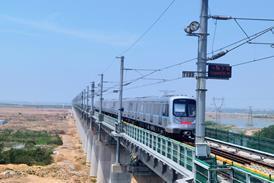ON JANUARY 13 French National Railways revealed that passenger traffic had responded well to the range of service enhancements and fares initiatives it had introduced last year. Long-distance business (measured in passenger-km) was up by 5·3%, with the figure for all passenger traffic up 4·4%. SNCF’s aim this year is to grow passenger business by 4%. To this end it will be launching regular-interval TGV services between Paris and Nantes in May, adding extra services on the Paris - Bordeaux route, cutting journey times between Paris and Granville, and introducing new rolling stock on numerous regional lines.
While all this is good news, SNCF is still threatened with industrial unrest pending agreements with staff on hours of work and pay issues. A series of unrelated events has meanwhile combined to generate much negative media coverage. Three level crossing accidents occurred on December 25, 26 and 27, each killing two people. This was followed by a six-year old child falling inexplicably from an overnight train on January 2. Judging by the coverage in some media, the fact that 50 people had died on French roads on the previous day was of little interest, this after a year when the falling trend in road deaths in France was reversed, with 8312 people killed during 1998.
Also attracting media attention was an official report about the pollution from diesel locos at La Villette depot serving Paris Est, which has become a cause célèbre for local residents. Among ideas discussed in the report were electrification of the route to Troyes, transfer of most of the depot’s activities to Noisy-le-Sec outside Paris, and stopping Basel - Paris trains in the suburbs to attach an electric loco for the final haul into the city, adding to the journey time on what is already seen as an uncompetitive route.
Less expected were formal accusations against SNCF from a Jewish Frenchman and a Frenchman born to Austrian parents of ’crimes against humanity’ for operating trains carrying Jews to Nazi concentration camps between 1941 and 1944. This provoked predictable outrage from railway staff and managers who had been active in the French Resistance movement in those years.




















